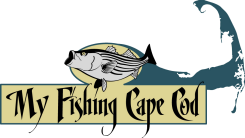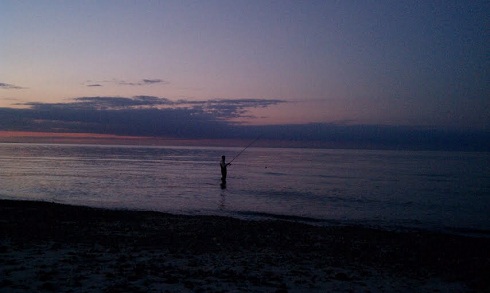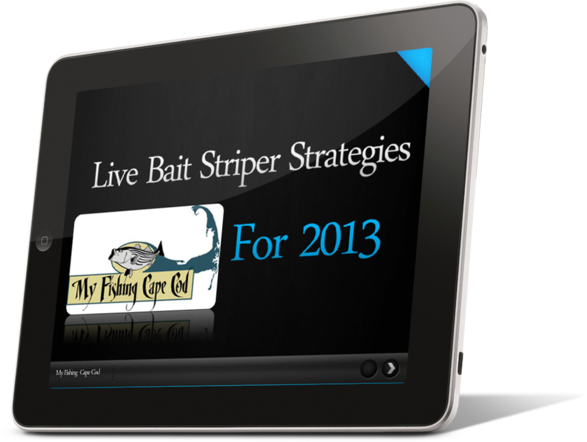Cape Cod's winter ocean has shifted countless tons of sand around the peninsula over the past few months. As a result, your favorite fishing spot may look a little different this spring. In some areas there no longer is a beach. While in other spots there is sand, where there has not been sand for years.
A house down the street from where I grew up almost sank into the Bay during that big snow storm a month or so ago. As luck would have it the house had just been purchased by a new homeowner. They are now erecting a sea wall of boulders to keep Cape Cod Bay out of the living room.
It has no doubt been a roller coaster ride for many Cape Cod homeowners. Those nights where the wind reached more than 50 mph would keep me awake too if I owned water front property. And we have certainly had plenty of those 50 mph nights.
Yet for Mother Nature this is nothing new. Cape Cod has forever been a dynamically shifting environment. It comes and it goes with the tide - sort of like the people who live here. Twenty thousand years from now Cape Cod may no longer be around, swallowed up by the Atlantic Ocean. I wonder what the fishing will be like then.
This season many beaches will be very different, compared to the last time most of us fished them back in the fall. There will be new cuts and breaks, sandbars and sandflats. I'm looking forward to checking out these areas during the day, but also during the night.
Early Season Night Fishing on Cape Cod
The Beachfront
I know that South Shore, Cape Cod Bay and Outer Cape Cod beaches took the brunt of this past winter. The coastline here is sandy, and exposed to the northern and easterly winds. Waves build, tides rise and the shore gets slammed. These areas undergo more physical change than the rugged shoreline of the Elizabeth Islands or Buzzards Bay - where there is more rock and protection from the wind.
Fishing these areas has always involved a lot of walking for me. Often times the most intriguing eddy or sandflat is miles from the nearest parking spot. A good boulder field could be a thirty minute walk down the coast, or involve a walk and a boat ride. Of course in some fortunate areas the good spots are a bit more accessible.
I haven't fishing the Outer Cape Cod beaches at night, but in Cape Cod Bay or on the South Shore I always just start casting and walking-sometimes for a mile or more. In these areas, even during the spring-time, the fish seem to randomly appear along the shore. This is different from areas where there is more current or structure, to keep the bass in one spot.
The southern portion of Cape Cod Bay's beaches are for the most part sand. This means you can expect a lot of physical change, and a lot of walking if you want to find a good bite at night. Of course you can do some research beforehand and locate a boulder field or grass patch, and then focus your efforts around there. For some reason bass do seem to occasionally spend some time hanging around boulders and patches before moving on.
If luck is on your side you'll be there for those precious minutes when the schools of bass stay in one spot.
Estuaries
I would say that estuaries are more reliable early in the season than the beachfront-as far as numbers are concerned. However the fish in my experience are generally smaller. Yet after 6 months of no fishing, I don't mind tangling with a 15 inch striper one bit. Of course your very next fish could be a keeper. That's the fun part of surf fishing Cape Cod during the spring - you never what size bass you may hook.
Many of Cape Cod's estuaries will have herring during the month of the May. You may no longer be able to use herring as bait, but they certainly work well as a natural fish-attractant. The area around a herring run is always a good area to check out in the spring. If the stars align you'll stumble across a school of bass crushing herring on the surface. The show the stripers put on is almost as impressive as when they are feeding on mackerel.
The outgoing tide has always been my favorite for fishing the mouth of the estuary, where it empties into the ocean. For the incoming tide, I prefer to position myself way back in the marsh and fish the tidal pools as they fill with life. Whatever you choose to do, remember to be cautious fishing estuaries, especially around current. Be even more careful if the wind is blowing hard onshore.
Night Time Techniques
One of the most famous night time baits on Cape Cod is the live eel. I am sure someone out there has enjoyed good success fishing live eels during the spring, however I really stink at it. During the spring of 2012 I cast live eels right into bass during the month of May and was denied each and every time. Go figure!
One bait that does work extremely well during May is freshly caught mackerel. I am going to place a big emphasis on the fresh stuff, because it works so much better than frozen macks. Most guys will cut a mackerel into two or three chunks, fishing one chunk at a time. This season, try tossing an entire dead mackerel out there and see what happens. To my surprise, my 2012 crews caught more bass with dead whole mackerel, than chunk mackerel.
If you choose to use artificial lures you will have plenty of options. I am consistently amazed by the amount of new lures and baits that appear on the market each season. Who knows what will be the most popular bait of 2013, but I can guarantee that there will be one lure that catches on and spreads like wildfire through the Cape Cod fishing community. In past years the Savage Sand Eel and Sebile have been top sellers.
However you don't have to cough up big bucks to have a good chance at a fish. Simple soft plastic baits skipped along the surface or in the midwater column will do just fine. Wooden swimmers and needlefish plugs will be at the top of my list this spring.
If you have a recommendation I'm all ears - just leave me a comment below.
One thing to always keep tabs on is the tide, especially at night. Depending on the area you choose to fish, tide may be a minor or major factor. This is particularly true when fishing sandbars or channels with a strong current. The fish (and you) will most likely move according to the tide.
I won't venture out onto expansive sandbars at night, just in case fog rolls in and I lose my sense of direction. A GPS can help, but still it's a little risky. Other areas where the bottom drops off quickly and close to shore, are ideal for surf fishing at night. In these spots I seem to have best luck fishing the last part of the incoming through the first part of the outgoing.
The Lonely Shoreline
Cape Cod's beaches at night, during the spring, are very quiet. Fishing the shoreline after dark is a lonely experience that I highly recommend you try. Fishing alone at night has always been a highly effective way for me to remain grounded, and connect with what's most important.
Several weeks from now you and I will again have a legitimate excuse to stay out all night. I am very much looking forward to returning to nocturnal life, venturing out into the darkness and wetting a line.
Before I sign off I wanted to let you know that the Live Bait Strategies for 2013 webinar replay will be live on the membership site until Monday at 12AM. If you are a member you can check it out by clicking on the image below.
If you are not yet a member and would like to tune in before it's removed, you can do so by clicking here.
Tight lines,
Ryan






Ryan, I really enjoyed your latest post,”new beaches at night”. Each spring returning to a favorite beach can be like fishing a new spot for the first time. Finding new troughs and holes are a big part of the challenge and reward of fishing the surf.
Most beaches undergo changes on a daily basis that are not so dramatic but stay off of that same beach for a few months and it might look like another planet when you go back in the spring. When I recon a beach in the spring I do it in daylight at low tide to really get the lay of the land” much safer” then make some mental notes ,even some sketches.when I do go back at night I know what’s out there,
It goes a long way towards removing a lot of guess work.keep up the good work and stay safe out there- art.
Hey Art,
Great to hear, I enjoyed writing it! I am right there with you, spring is a great time to explore the beach and find some new honey holes.
Lots of beaches on the Cape look like a different planet right now. It’s actually quite incredible, especially if you get down to the National Seashore. Good move doing your recon at low tide – as I’m sure you know, a full moon low tide is really ideal.
I will be sure to keep up the good work, and you stay safe out there too.
Tight lines,
Ryan
I had to laugh to my self reading about casting to bass and they wouldn’t touch it.Years ago we went to Monomy in May,we heard they hitting on ells,everybody was loading up but us,they were using “sand ells”,at the ramp the next day one of the hi liners yelled to us,”have you got the right stuff today”,we did have the right stuff and did very well.I guess that’s the way you learn a new area.
Hey Cuda,
I can empathize with you big time. Always a bit frustrating, but hey they’re fish – what can ya do? I think you are right on with trial and error being the best way to learn a new area.
Good news is that effort usually pays off. I know fresh dead squid can produce well down in that area too.
Take care!